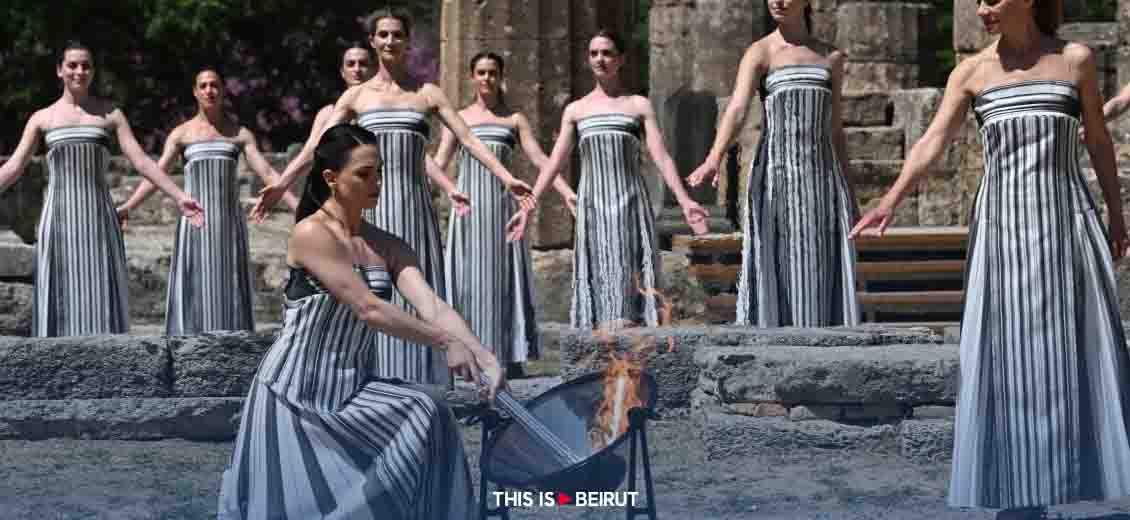
©ARIS MESSINIS / AFP
The sacred flame of the Paris 2024 Olympics was lit on Tuesday in Olympia, Greece, the birthplace of the ancient Games, in a ceremony inspired by antiquity and marked by messages of hope amid multiple global crises.
"In ancient times, the Olympic Games brought together the Greek city states, even – and in particular – during times of war and conflict," said International Olympic Committee President Thomas Bach.
"Today, the Olympic Games are the only event that brings the entire world together in peaceful competition. Then, as now, the Olympic athletes are sending this powerful message: yes, it is possible to compete fiercely against each other and at the same time live peacefully together under one roof," he said.
Owing to cloudy weather, Greek actresses in the role of ancient priestesses used a flame lit in a rehearsal Monday in the 2,600-year-old Temple of Hera, near the stadium where the Olympics were born in 776 BC.
Carrying the flame in a pot, Greek actress Mary Mina lit the torch for the first bearer, 2020 Olympic rowing champion Stefanos Ntouskos.
Retired French swimmer Laure Manaudou, who won her first gold medal at the 2004 Athens Olympics, followed as France's first torchbearer in Olympia.
Officials stressed on Tuesday that the Paris Games will set new milestones, following the legacy of the other two prior Olympics held in the French capital.
"The Olympic Flame will shine over the first Olympic Games inspired by our Olympic Agenda reforms from start to finish," Bach said.
"These Olympic Games will be younger, more inclusive, more urban, more sustainable. These will be the very first Olympic Games with full gender parity, because the IOC allocated exactly 50% of the places to female and male athletes," he said.
Paris Olympics chief organiser Tony Estanguet noted that women took part for the first time in the Paris 1900 Games, while the first Olympic Village was created for the Paris 2024 Games.
For the first time since the COVID-19 pandemic imposed toned-down events for the 2020 Tokyo Olympics and 2022 Beijing Winter Games, the ceremony was back with full regalia and scores of spectators.
Greek President Katerina Sakellaropoulou, French sports minister Amelie Oudea-Castera and Paris Mayor Anne Hidalgo were present at the ceremony.
American mezzo soprano Joyce DiDonato delivered the Olympic anthem.
The torch harks back to the ancient Olympics when a sacred flame burned throughout the Games. The tradition was revived in 1936 for the Berlin Games.
During the 11-day relay on Greek soil, some 600 torchbearers will carry the flame over a distance of 5,000 kilometres (3,100 miles) through 41 municipalities.
The Olympic flame will be handed over to Paris 2024 organisers in a ceremony at the all-marble Panathenaic Stadium, site of the first modern Olympic Games of 1896, on April 26.
Nana Mouskouri, the 89-year-old Greek singer with a worldwide following, has been invited to perform at the ceremony.
On April 27, the flame will begin its journey to France on board the 19th-century three-masted barque Belem, which was launched just weeks after the Athens 1896 Games.
The Belem, a French historical monument, carried out trade journeys to Brazil, Guyana and the Caribbean for nearly two decades.
France's last surviving three-mast steel-hulled boat is expected to arrive in Marseille on May 8.
Ten thousand torchbearers will then carry the flame across 64 French territories.
It will travel through 400 towns and dozens of tourist attractions during its 12,000-kilometre (7,500-mile) journey through mainland France and overseas French territories in the Caribbean, Indian Ocean and Pacific.
On July 26, it will form the centrepiece of the Paris Olympics opening ceremony.
The ceremony is to be held on the river Seine. It will be the first time that the ceremony is not held in the Games' main stadium.
However, French President Emmanuel Macron said on Monday that it could be moved to the national stadium in the event of a security threat.
Macron said that, instead of teams sailing down the Seine on barges, the ceremony could be "limited to the Trocadero" building across the river from the Eiffel Tower or "even moved to the Stade de France."
With AFP
"In ancient times, the Olympic Games brought together the Greek city states, even – and in particular – during times of war and conflict," said International Olympic Committee President Thomas Bach.
"Today, the Olympic Games are the only event that brings the entire world together in peaceful competition. Then, as now, the Olympic athletes are sending this powerful message: yes, it is possible to compete fiercely against each other and at the same time live peacefully together under one roof," he said.
Owing to cloudy weather, Greek actresses in the role of ancient priestesses used a flame lit in a rehearsal Monday in the 2,600-year-old Temple of Hera, near the stadium where the Olympics were born in 776 BC.
Carrying the flame in a pot, Greek actress Mary Mina lit the torch for the first bearer, 2020 Olympic rowing champion Stefanos Ntouskos.
Retired French swimmer Laure Manaudou, who won her first gold medal at the 2004 Athens Olympics, followed as France's first torchbearer in Olympia.
'Inclusive' Games
Officials stressed on Tuesday that the Paris Games will set new milestones, following the legacy of the other two prior Olympics held in the French capital.
"The Olympic Flame will shine over the first Olympic Games inspired by our Olympic Agenda reforms from start to finish," Bach said.
"These Olympic Games will be younger, more inclusive, more urban, more sustainable. These will be the very first Olympic Games with full gender parity, because the IOC allocated exactly 50% of the places to female and male athletes," he said.
Paris Olympics chief organiser Tony Estanguet noted that women took part for the first time in the Paris 1900 Games, while the first Olympic Village was created for the Paris 2024 Games.
For the first time since the COVID-19 pandemic imposed toned-down events for the 2020 Tokyo Olympics and 2022 Beijing Winter Games, the ceremony was back with full regalia and scores of spectators.
Greek President Katerina Sakellaropoulou, French sports minister Amelie Oudea-Castera and Paris Mayor Anne Hidalgo were present at the ceremony.
American mezzo soprano Joyce DiDonato delivered the Olympic anthem.
The torch harks back to the ancient Olympics when a sacred flame burned throughout the Games. The tradition was revived in 1936 for the Berlin Games.
During the 11-day relay on Greek soil, some 600 torchbearers will carry the flame over a distance of 5,000 kilometres (3,100 miles) through 41 municipalities.
Security Concerns
The Olympic flame will be handed over to Paris 2024 organisers in a ceremony at the all-marble Panathenaic Stadium, site of the first modern Olympic Games of 1896, on April 26.
Nana Mouskouri, the 89-year-old Greek singer with a worldwide following, has been invited to perform at the ceremony.
On April 27, the flame will begin its journey to France on board the 19th-century three-masted barque Belem, which was launched just weeks after the Athens 1896 Games.
The Belem, a French historical monument, carried out trade journeys to Brazil, Guyana and the Caribbean for nearly two decades.
France's last surviving three-mast steel-hulled boat is expected to arrive in Marseille on May 8.
Ten thousand torchbearers will then carry the flame across 64 French territories.
It will travel through 400 towns and dozens of tourist attractions during its 12,000-kilometre (7,500-mile) journey through mainland France and overseas French territories in the Caribbean, Indian Ocean and Pacific.
On July 26, it will form the centrepiece of the Paris Olympics opening ceremony.
The ceremony is to be held on the river Seine. It will be the first time that the ceremony is not held in the Games' main stadium.
However, French President Emmanuel Macron said on Monday that it could be moved to the national stadium in the event of a security threat.
Macron said that, instead of teams sailing down the Seine on barges, the ceremony could be "limited to the Trocadero" building across the river from the Eiffel Tower or "even moved to the Stade de France."
With AFP
Read more




Comments